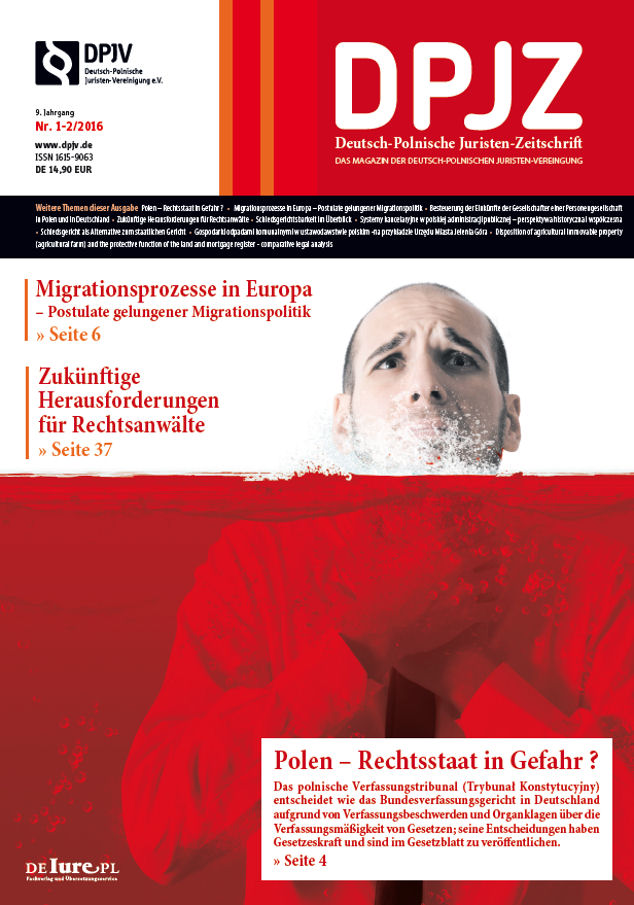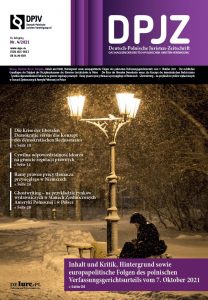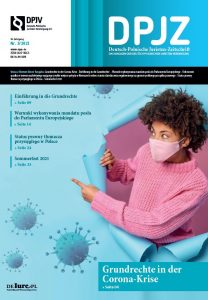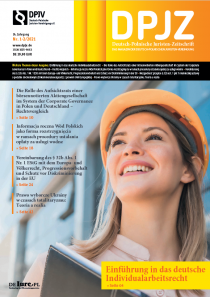Inhaltsverzeichnis:
- „Polen – Rechtsstaat in Gefahr ?“ von Peter v. Feldmann,
- „Migrationsprozesse in Europa – Postulate gelungener Migrationspolitik“ von Ewa Tuora-Schwierskott (LL.M.) und Sascha Tamim Asfandiar (LL.M.),
- „Besteuerung der Einkünfte der Gesellschafter einer Personengesellschaft in Polen und in Deutschland“ von Fritz Lang und Janusz Orlowski,
- „Zukünftige Herausforderungen für Rechtsanwälte“ von Peter Diedrich,
- „Schiedsgerichtsbarkeit im Überblick“ von Oliver Korte und Sven Oswald,
- „Systemy kancelaryjne w polskiej administracji publicznej – perspektywa historyczna i wspólczesna“ von Radoslaw Medrzycki,
- „Schiedsgericht als Alternative zum staatlichen Gericht“ von Przemyslaw Drapala und Robert Siwik,
- „Gospodarki odpadami komunalnymi w ustawodawstwie polskim -na przykladzie Urzedu Miasta Jelenia Góra“ von Beata Mucha,
- „Disposition of agricultural immovable property (agricultural farm) and the protective function of the land and mortgage register – comparative legal analysis“ von Radoslaw Pastuszko
Streszczenia / Summaries
I. Dr. Peter v. Feldmann
Vorsitzender Richter am Oberverwaltungsgericht Berlin a.D.
Polen – Rechtsstaat in Gefahr ?
Schlussbemerkung:
Da die Regierung und die Parlamentsmehrheit anscheinend weiterhin nicht bereit sind, die Entscheidungen des Verfassungstribunals zu befolgen, ist eine handfesten Verfassungskrise abzusehen. Diese ist vor allem dann zu erwarten, wenn sich die bisherige Auseinandersetzung über die Rolle des Verfassungstribunals zukünftig mit dem Streit um die Verfassungsmäßigkeit der bisherigen Eingriffe in die Organisation des öffentlich-rechtlichen Rundfunks durch das sogenannte kleine Mediengesetz sowie durch die mit dem für das Frühjahr geplanten umfassenden Eingriffen in die Freiheit der Medien verbindet, nämlich dann, wenn das Verfassungstribunal auch diese Gesetzgebungsakte – wie zu erwarten ist – für verfassungswidrig erklärt.
Die Europäische Union kann und darf eine solche Entwicklung in Polen nicht hinnehmen. Es gilt daher, durch deutlich darauf hinzuwirken, dass Polen Państwo Prawa, ein Rechtsstaat, bleibt.
Keywords: Verfassungstribunal, Geicht, Polen, Demokratie, Rechtsstaat.
Über den Autor
Dr. Peter v. Feldmann
Vorsitzender Richter am Oberverwaltungsgericht Berlin a.D., feldhaasen@t-online.de
II. Dr. Ewa Tuora-Schwierskott, LL.M.
Sascha Tamim Asfandiar, LL.M.
Migrationsprozesse in Europa – Postulate gelungener Migrationspolitik
Zusammenfassung: Das Oxfort Wörterbuch definiert Migrationen als Bewegung von Menschen in neue Gebiete oder Länder mit dem Zweck Arbeit zu finden oder die Lebensumstände aufzubessern. So lange die Migranten mit Problemen in ihren Ländern zu kämpfen haben und so lange sie sich in anderen Ländern ein besseres Leben versprechen, werden die Menschen weiterhin nach Europa flüchten. Unter diesen Umständen ist es notwendig eine rationale Migrationspolitik einzuleiten, bei der die Erfahrungen der Vergangenheit berücksichtigt werden müssen. Alle Statistiken zeigen eindeutig, dass die Zahl der in den Ländern der Europäischen Union lebenden Bevölkerung systematisch sinkt. Im Jahr 1900 stellte die Bevölkerung Europas 15% der gesamten Weltbevölkerung dar – im Jahr 2050 werden es nach neusten Prognosen lediglich 5 % sein. Dies wird eine bedeutende Einschränkung von Arbeitskräften zur Folge haben. Diese Tatsache verursacht zahlreiche Probleme vor allem wirtschaftlichen Natur – bereits jetzt leiden bestimme Zweige unseres wirtschaftlichen und sozialen Lebens unter ständigen Mangel an Mitarbeitern; es sind medizinische Berufe, Handwerker, Ingenieure etc. Integrationsprozesse sollen auf folgenden zwei Ebenen ablaufen: 1. Zugang der Migranten und ihrer Abkömmlinge zu den rechtlichen, sozialen und politischen Institutionen des Staates, welche es ihnen erlauben an dem demokratischen Staat aktiv teilzunehmen, 2. Bildung von positiven Veränderungen in der Gesellschaft, politischen Kultur und politischen Struktur des demokratischen Staates.
Keywords: Migrationen, Integration, Entwicklung der demokratischen Gesellschaft.
Summary: The Oxford dictionary defines migration as the movement of people to find new areas or countries with the purpose of labor or to make improvements in living conditions. As long as the migrants who are struggling with problems in their own countries and as long as they promise a better life in other countries, people will continue to flee to Europe. Under these circumstances, it is necessary to initiate a rational immigration policy, in which the experiences of the past have to be considered. All statistics clearly show that the number of people living in the countries of the European Union population systematically decreases. In 1900 the population of Europe represented 15% of the total world population – in 2050 there will be only 5%. This fact caused numerous problems, especially economic nature. – constant lack of staff; there are medical professions, craftsmen, engineers etc. Integration processes should run at two levels: 1. access of migrants and their descendants to the legal, social and political institutions of the state, which allow them to participate actively in the democratic state. 2 formation of positive changes in society, political culture and political structure of the democratic state.
Keywords: migration, integration, development of democratic society.
Über die Autoren: Dr. Ewa Tuora-Schwierskott, LL.M., Vorstandsmitglied der DPJV, Geschäftsführerin des juristischen Verlages de-iure-pl. Autorin des Buches; „Migracje a polityki migracyjne. Prawo Unii Europejskiej na tle wybranych doświadczeń krajowych ”. schwierskott@dpjv.de.
Sascha Tamim Asfandiar, LL.M. Vorstandsmitglied der DPJV, asfandiar@dpjv.de.
III. Dipl. Finanzwirt (FH) Fritz Lang,
Fachhochschule der Sächsischen Verwaltung, Meissen, Deutschland
Dr. Janusz Orłowski, Uniwersytet Warmińsko-Mazurski w Olsztynie (Ermländisch-Masurische Universität in Olsztyn), Polen
Besteuerung der Einkünfte der Gesellschafter einer Personengesellschaft in Polen und in Deutschland
Zusammenfassung: Die Rechtssysteme sowohl Polens als auch Deutschlands kennen die Rechtsfigur der Personengesellschaft. Die klassischen Gesellschaftsformen der Gesellschaft bürgerlichen Rechts, der Offenen Handelsgesellschaft, der Kommanditgesellschaft sowie der Partnerschaftsgesellschaft ähnlich sich dabei im jeweiligen Rechtsstatut, was nicht zuletzt gemeinsamen historischen Wurzeln geschuldet ist. Auch die Einkommensbesteuerung der natürlichen Personen in ihrer grundlegenden Struktur ist in beiden Staaten vergleichbar. Differenziert wird zwischen unbeschränkter und beschränkter persönlicher Steuerpflicht, woran sich der Besteuerungsumfang im Sinne des Universalitäts- bzw. des Territorialitätsprinzips orientiert. Einkünfte werden nach dem Nettoprinzip ermittelt. Das polnische Einkommensteuerrecht lässt von diesem Grundsatz jedoch auch Ausnahmen zu. Unterschiedlich ausgestaltet sind insbesondere die Steuertarife. Während Deutschland hier dem Grunde nach nur einen linear-progressiven Regeltarif kennt, ist der Steuertarif in Polen als Staffeltarif ausgestaltet. Darüber hinaus kennt das polnische Einkommensteuerrecht verschiedene Pauschalbesteuerungen. Auch die Besteuerung der Gesellschafter von Personengesellschaften ähnelt sich in beiden Staaten. Sowohl das deutsche als auch das polnische Einkommensteuerrecht folgen in diesem Bereich dem sog. Transparenzprinzip. Einkünfte werden nicht auf der Ebene der Gesellschaft, sondern auf der Ebene der hinter der Gesellschaft stehenden Gesellschafter besteuert. Im Ergebnis dieser einführenden Untersuchung steht daher, dass die Behandlung der Personengesellschaften sowohl in zivilrechtlicher als ertragsteuerrechtlicher Hinsicht in Deutschland und Polen grundsätzlich vergleichbar ist. Unterschiedlich Ansätze in Detailfragen aufzuzeigen bleibt jedoch weiteren Untersuchungen vorbehalten.
Keywords: Steuerrecht, Einkommensbesteuerung, Steuerrecht, Besteuerung der Gesellschafter von Personengesellschaften, Polen, Deutschland.
Summary: The legal systems in both Poland and Germany know the legal concept of business partnership. The classic forms of society the civil-law partnership, the general partnership, the limited partnership shank similar thereby in the relevant statute, what is owed not least common historic rule roots. The income taxation of natural persons in their basic structure is similar in both countries. As a result of this introductory study is therefore that the treatment of the partnerships is so well-basic addition comparable to civil or tax legal terms in Germany and Poland. Different approaches to show detailed questions but further systems are reserved.
Keywords: tax law, income taxation, tax law, taxation of partnerships, Poland, Germany.
Über die Autoren
Dr Janusz Orłowski – promovierter Hochschullehrer am Lehrstuhl für Finanzrecht der Jura- und Verwaltungs – Fakultät an der Ermländisch-Masurischen Universität in Olsztyn (Polen), spezialisiert im Steuerrecht – Autor von mehreren Aufsätzen u. Kommentaren; tätig als Rechtsberater.
Dr Janusz Orłowski – adiunkt w Katedrze Prawa Finansowego na Wydziale Prawa i Administracji Uniwersytetu Warmińsko-Mazurskiego w Olsztynie, specjalizuje się w prawie podatkowym – autor wielu artykułów i komentarzy; jest radcą prawnym.
Dipl. Finanzwirt (FH) Fritz Lang – mehr als zwanzigjährige Tätigkeit als hauptamtlicher Dozent an der Fachhochschule der Sächsischen Verwaltung Meißen (FHSV); in dieser Zeit Tätigkeit als Studienbereichsleiter Ertragsteuern, Fachbereichsleiter, kommissarischer Rektor der Hochschule, Stellvertreter des Rektors. Autor mehrerer Aufsätze; Co-Autor mehrerer Fachbücher; Mitherausgeber und Autor eines Umsatzsteuerkommentars.
IV. Dr. Peter Diedrich
Rechtsanwalt und Notar, DSC Legal Rechtsanwaltsgesellschaft mbH, Berlin
Vorsitzender der Deutsch-Polnischen Juristen-Vereinigung e.V., Berlin
Zukünftige Herausforderungen für Rechtsanwälte
Zusammenfassung: Durch den steigenden Wettbewerbsdruck wird die strategische Profilbildung aller Kanzleien mit Blick auf Regionen, Schwerpunkte und Mandanten entscheidend. Spezialisierung und Alleinstellungsmerkmale entscheiden über den Erfolg. Der Wettbewerb in der deutschen und polnischen Anwaltschaft hat sich innerhalb des letzten Jahrzehnts deutlich verschärft. Technische Entwicklungen werden die Arbeitsteilung, die Organisationsstrukturen und die Prozesse der Arbeitsteilung in der Rechtsberatung weiter verändern. Die Schnittstellen zu den relevanten Zielgruppen, den Mandanten sowie den Behörden und Gerichten verschieben sich zunehmend in den digitalen Bereich.
Keywords: Wettbewerb in der deutschen und polnischen Anwaltschaft, Internationalisierung, Marketing, Kanzleiführung, technischer Wandel.
Summary: Due to the increasing competitive pressure the strategic profiling of all firms with regard to regions, priorities and clients is crucial. Specialization and unique features determine the success. The competition in the German and Polish advocacy intensified significantly over the last decade. Technical developments are the division of labor, changing the organizational structures and processes of the division of labor in providing legal advice on. The interfaces to the relevant target groups, the clients and the authorities and courts move increasingly into the digital domain.
Keywords: competition in the German and Polish advocacy, internationalization, marketing, law firm management, technical change.
| Über den Autor Dr. Peter Diedrich | Rechtsanwalt & Notar
Adwokat (Polen) +49 30 889 29 44-0 diedrich@dsc-legal.com |
Dr. Peter Diedrich ist Gründungspartner von DSC Legal und auf die Beratung von nationalen und internationalen Mandanten in Bezug auf Immobilieninvestitionen in Deutschland spezialisiert. Dr. Peter Diedrich ist Vorstandsvorsitzender der International Association of Jewish Lawyers and Jurists German Section e. V., Berlin und Board-Mitglied der Mutterorganisation (IAJLJ) in Tel Aviv. Außerdem ist er Vorstandsvorsitzender der Deutsch-Polnischen Juristenvereinigung (www.dpjv.de). Seit April 2013 ist Dr. Peter Diedrich Vorsitzender der Arbeitsgruppe Immobilien des weltweiten Firmennetzwerks IR Global (800 Mitgliedsfirmen). Seit über 20 Jahren berät er Mandanten bei Immobilientransaktionen, -investitionen und -finanzierungen. Darüber hinaus praktiziert Herr Dr. Diedrich als Notar und verfügt über Erfahrung und Expertise im Gesellschaftsrecht (Mergers & Acquisitions), sowie im Bereich der internationalen Schiedsgerichtsbarkeit.
V.Oliver Korte und Dr. Sven Oswald
Schiedsgerichtsbarkeit im Überblick
Zusammenfassung
Schiedsverfahren sind eine gute, bei internationalen Sachverhalten oft unverzichtbare, Alternative zu Prozessen vor staatlichen Gerichten. Größter Vorteil ist dabei die internationale Vollstreckbarkeit. Im Einzelfall kritisch zu prüfen ist insbesondere die Kostenfrage. Dabei spielt v.a. auch die Auswahl der Schiedsinstitution eine Rolle. Wichtig ist Sorgfalt bei der Abfassung der Schiedsvereinbarung und später bei der Auswahl der Schiedsrichter. Wer dies beherzigt und die im Beitrag genannten Vor- und Nachteile abwägt, sollte keinen Anlass haben, seine Entscheidung für ein Schiedsverfahren zu bereuen.
Keywords: Schiedsverfahren, Schiedsgericht, Polen, Deutschland.
Summary
Arbitration is a good, in international cases often indispensable, alternative to litigation before state courts. The biggest advantage is the international enforceability. In individual cases, to critically examine in particular the question of costs. Important care is in the drafting of the arbitration agreement and later in the choice of referee. Who heeded this and said the post weighs pros and cons, you should have no reason to regret his decision to go to arbitration.
Keywords: arbitration, court, Poland, Germany.
Über die Autoren:
Oliver Korte, Rechtsanwalt, Fachanwalt für Handels- und Gesellschaftsrecht, SKW Schwarz Rechtsanwälte Hamburg, o.korte@skwschwarz.de.
VI. Radosław Mędrzycki
Systemy kancelaryjne w polskiej administracji publicznej – perspektywa historyczna i współczesna
Abstrakt (streszczenie): Przedmiotem artykułu jest prezentacja systemów kancelaryjnych stosowanych historycznie i współcześnie w polskiej administracji publicznej w tym próba odpowiedzi na pytanie o konieczność stosowania jednolitego systemu kancelaryjnego przez tę administrację. Waga zagadnienia wynika z faktu, iż systemy kancelaryjne stanowią jedną z podstaw postępowania z dokumentacją wytwarzaną i napływającą do urzędu administracji publicznej wpływając w znacznej mierze na szybkość załatwiania spraw. W badaniach posłużono się kluczowymi dla rozwoju systemów kancelaryjnych w Polsce instrukcjami kancelaryjnymi oraz wypowiedziami przedstawicieli doktryny. W związku z tym wykorzystano głównie metodę historycznoprawną i teoretycznoprawną. W wyniku badań stwierdzono, iż w urzędach polskiej administracji publicznej korzysta się głównie z bezdziennikowego systemu kancelaryjnego, chociaż nie oznacza to homogeniczności poszczególnych rozwiązań kancelaryjnych jak i braku możliwości zastosowania systemu dziennikowego – chociaż jest on znacząco limitowany.
Słowa kluczowe: system kancelaryjny, administracja publiczna, urząd.
Summary: The aim of the article is to present the past and present Polish record systems of public administration in order to answer the question of the necessity of the use of a unified record system in public administration. The importance of this matter is motivated by the fact that Polish record systems are one of the fundaments of case management of documents generated or received by the public administration. Namely, the discussed systems have a major impact on the rate at which official matters are conducted.
The analysis is based both on the official instructions, crucial for the record system development, and on the opinions of the representatives in the area of the discussed matter. Due to the choice of research material, the theoretical-law and historical-law methods have been used for the means of the analysis.
During the course of the analysis it has been proved that the fact of the nationwide use of the non-register record system does not imply the use of homogeneous solutions in the area of record system management. Moreover, the use of a register based system, however a vastly limited one, is not impossible.
Keywords: chancellery system, public administration, bureau.
Über den Autor: Radosław Mędrzycki, Katedra Prawa Administracyjnego i Samorządu Terytorialnego, Wydział Prawa i Administracji Uniwersytet Kardynała Stefana Wyszyńskiego w Warszawie, Adres poczty elektronicznej: r.medrzycki@uksw.edu.pl r. medrzycki@gmail.com.
VII. Przemysław Drapała, Robert Siwik
Schiedsgericht als Alternative zum staatlichen Gericht
Zusammenfassung
Die Schiedsgerichtsbarkeit gewinnt in Polen immer größere Bedeutung. Schnelligkeit, Flexibilität sowie die Vertraulichkeit des Verfahrens gehören zu den Vorteilen, auf die kein Wirtschaftsunternehmen bei der Vertragsgestaltung verzichten sollte. Es muss beachten werden, dass die Auswahl des Schiedsgerichts eine der wichtigsten Weichenstellungen für das spätere Schiedsverfahren ist.
Keywords: Schiedsgerichtsbarkeit, Schiedsvereinbarung, Gericht, Schiedspruch.
Summary: The arbitration is gaining increasing importance in Poland. Speed, flexibility and the confidentiality of the process are the advantages to which no business enterprises should avoid when drafting contracts. It is important to note that the selection of the judges is one of the most important decisions for the subsequent arbitration.
Keywords: arbitration, arbitration agreement, courts, arbitration.
Über die Autoren
Prof. Dr. Przemysław Drapała – Partner bei der Kanzlei JARA DRAPAŁA & PARTNERS in Warschau, E-mail: przemyslaw.drapala@jara-law.pl.
Robert Siwik – Managing Partner bei der Kanzlei BIERĆ SIWIK & PARTNERS sp.k. (www.bsplaw.pl); Vorsitzender des Ausschusses für öffentliches Auftragswesen der AHK Polen; E-Mail: robert.siwik@bsplaw.pl
VIII. dr Beata Mucha
Państwowa Wyższa Szkoła Zgawodowa im. A. Silesiusa w Wałbrzychu, Instytut Przyrodniczo-Techniczny, ul. Zamkowa 4, Wałbrzych, Polska
Gospodarki odpadami komunalnymi w ustawodawstwie polskim -na przykładzie Urzędu Miasta Jelenia Góra
Streszczenie: W Polsce od dnia 1 lipca 2013 r. zaczęła obowiązywać nowa ustawa o utrzymaniu czystości i porządku w gminach, która zmieniło dotychczasowy system gospodarowania odpadami komunalnymi. Nowa ustawa śmieciowa odpowiedzialność za gospodarkę odpadami oddaje w ręce gmin.
Główne cele ustawy o utrzymaniu czystości i porządku w gminach to przede wszystkim upowszechnienie prowadzenia selektywnego zbierania odpadów komunalnych „u źródła”, zmniejszenie ilości składowanych odpadów komunalnych, poprzez m.in. zapewnienie powstania odpowiednich instalacji do odzysku lub unieszkodliwiania odpadów. Dzięki ich wdrożeniu można będzie ocenić ich efektywność a także dostrzec słabe miejsca w tym przepływie i ujawnić „wąskie gardła” czy rozwiązania nieefektywne i obarczone nadmiernymi kosztami.
W przypadku gospodarki odpadami łańcuch dostaw – nazywany często łańcuchem usuwania tworzą wytwarzający odpady mieszkańcy, podmiot organizujący zbiórkę odpadów, a następnie podmiot je segregujący, od którego wysegregowane odpady mogą być wykorzystane na potrzeby osób trzecich. Na końcu łańcucha jest składowisko odpadów. Logistyka traktuje łańcuch usuwania jako niezależny od ogniw jeden spójny system, gdzie wszystkie działania muszą podlegać wspólnemu planowaniu, jednolitej organizacji i realizacji wytyczonego celu.
W artykule zaprezentowano gospodarkę odpadami komunalnymi zgodnie z ustawodawstwem polskim na przykładzie Urząd Miasta Jeleniej Góry, oraz jakie rozwiązania logistyczne (informacyjne, techniczne) można wykorzystać w gospodarce odpadami.
Słowa kluczowe: odpady komunalne, segregacja, łańcuch usuwania
Summary: Environmental protection awareness of the Polish population is growing. The problem of municipal waste is cumbersome. No one needs convincing that it requires effective solution. The existing legislation enforce measures whose purpose is organizing municipal solid waste management and indicate the not only who has to dobut also what should be done.
The purpose of this article is to present the municipal solid waste management in accordance with the Polish the legislation on the example of Office of Jelenia Góra, and what logistics solutions (information, specifications) can be used in waste management. Thanks to their implementation can be assessed their efficiency and also perceive weak spots in the flow and reveal the „bottlenecks“ and inefficient to solutions.
Keywords: municipal waste, segregation, waste removal
Über die Autorin: dr Beata Mucha. Państwowa Wyższa Szkoła Zgawodowa im. A. Silesiusa w Wałbrzychu, Instytut Przyrodniczo-Techniczny, ul. Zamkowa 4, Wałbrzych, Polska, beatam3@onet.eu.
IX. Radosław Pastuszko
Disposition of agricultural immovable property (agricultural farm) and the protective function of the land and mortgage register – comparative legal analysis
Summary:
- In agricultural real property (farmsteads) trading records from Land and Property Register and from land and mortgage register fulfils complementary functions. Iunctim between these two registers is essential to proper registrational determination of an agricultural property as well as legal – in relation to the title legitimizing the concerned legal transactions. Specific particular aspect related to trading of agricultural real property manifests itself in the fact that situations may occur in which the nature of the real property as agricultural one is determined both by the register and the entry in Section I-0, but the said nature may prove to be out of date due to a change in the local development plan, which in turn allows for a change of designation of a real property as non-agricultural one or vice versa.
- None of the described functions related to trading of agricultural real property (farmstead) has any direct relevancy in the case of buyer’s erroneous impression about the nature of the real estate, according to its description in the so-called presentation of the parties in the notarial deed. Judicial practice was established stating that none of these functions protect the buyer for example in a case of invoking an error as to the substance of the legal action. It is assumed that before the contract is concluded both parties in the expected care and notary, within the required professional diligence, should ensure themselves as to the nature of the disposed property.
- The performed analysis of agricultural real property trading shows that registration of agricultural law transactions in land and mortgage register fulfils an important function of strengthening security of the trading.
- The lack of established land and mortgage register for disposed agricultural property does not constitute an obstacle for conclusion of contract but, by virtue of Art. 92 § 4 of the NPA, it is the duty of a notary to place in the notarial deed an application to establish land and mortgage register for the purchased property.
- In most EU Member States trading in agricultural real properties is regulated on the basis of separated provisions as compared to general real estate trading. Carried out by the regulation in question objectives regarding the development of social and spatial structure in agriculture are justified on the one hand by the particular nature of the EU Common Agricultural Policy, while at the same time presented as an „overriding requirements of public interest“, which may justify restrictions on free movement of capital (Art. 63 TFEU) . National regulations aimed at prevention of acquisition of agricultural land for purely speculative reasons are facilitating land acquisition by persons who intend to actually cultivate them and thus correspond to aim of pursuing public interest in a Member State, in which agricultural land is a limited natural resource.
However, these measures must not go beyond what is necessary in order to achieve this objective. First of all, they cannot be particularly burdensome. Secondly, the national legislature should use the least restrictive structures. With respect to the second requirement particularly important is the need to define reasonable and transparent conditions for implementation of restrictive measures on participants of legal transactions. Solutions granting control authorities too far-reaching discretion in evaluation are unacceptable. It also entails the need for ensuring adequate verification system over bodies controlling real estate trading. The primary perspective means basically the determination whether the provisions of the Treaty concerning free movement of capital (Art.63 of the TFEU) are not against national legislation which allow for the acquisition of real estate properties (in particular – agricultural property) on the condition that the specific subjective and subject-matter prerequisites are met. According to established judicial practice, such restrictions may be acceptable if the measures aim at non-discriminatory manner to pursue public interest and if they are consistent with the principle of proportionality, that is they are appropriate for attaining the intended purpose and do not go beyond what is necessary to attain that objective.
Member States regulations concerning the acquisition of real property differ significantly in terms of a specific terms and the purposes for achieving of which they are formulated, and their compliance with EU provisions is assessed mainly within the framework of investigation of the principle of proportionality and therefore it is dependent upon the specific relationship between the stated objective and the measures adopted.
- At the present day, the diversity of substantive law and land and mortgage registers institutions of rights in rem in the European Union Member States seems to be significant enough to put in question a concept of implementing effective measures to harmonize them. This applies to both the fundamental difference between the systems of statutory law and common law, as well as to the differences between the various continental systems. The remarks raised above on Polish agricultural real property trading system and its consequences for the legal state reported in land and mortgage register constitute only a tiny example of the problems that occur in the actual legal trading.
- The potential benefit of creating an appropriate system obviously cannot be overestimated especially in the field of implementation of (generally understood) informative or protective function. Just as the functions and importance of the institution of land and mortgage registers are indisputable, at the same time it is difficult to ignore the natural circumstance that the appropriate implementation of these functions is determined by substantive law solutions. In other words, it is difficult to speak about the appropriate level of security of real property trading without the condition sine qua non in the form of a valid national legislation. The concept of universal land and mortgage register solutions is theoretically feasible to implement, but only formally. At the present stage of European integration it is impossible to imagine that this will allow for autonomous „effectiveness“ of land and mortgage registers with regard to security of trading. The mentioned differences in legal cultures of various institutions raise doubts that there is a real chance to adopt solutions for harmonization that would be acceptable for the individual states.
Streszczenie: Przedmiotem analizy jest ocena realizacji funkcji ochronnej ksiąg wieczystych w odniesieniu do nieruchomości rolnych w polskim systemie prawa. Stan prawny gruntów rolnych ujawniony w księdze wieczystej znacznie częściej niż w przypadku pozostałych rodzajów nieruchomości nie odzwierciedla rzeczywistego stanu prawnego. Przyczyny takiego stanu rzeczy mają zróżnicowany charakter i dotyczą zarówno płaszczyzny materialnoprawnej, jak i stricte wieczystoksięgowej. Rozważania obejmują charakterystykę podstaw normatywnych obrotu nieruchomościami rolnymi i przedstawienie szczególnego charakteru przedmiotu tego obrotu. Podjęta problematyka procesowa dotyczy przede wszystkim konsekwencji oznaczenia nieruchomości w dokumentach urzędowych stanowiących podstawę wpisu w księdze wieczystej oraz zakresu kognicji sądu w postępowaniu o wpis prawa.
Keywords: agricultural land, land and mortgage register, basis for entry, court jurisdiction, agricultural law
Über den Autor: dr Radosław Pastuszko – adiunkt w Katedrze Prawa Rolnego i Gospodarki Gruntami, Wydział Prawa i Administracji, Uniwersytet Marii Curie – Skłodowskiej w Lublinie, rpastuszko@gmail.com.



